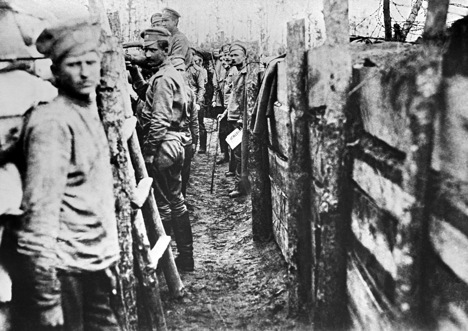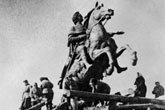Letters from the front

Russian soldiers inside first-line trenches near Panevezis railroad on the Dvina Front. Source: RIA Novosti
At the outbreak of war, Russia implemented the “Provisional Regulations on Military Censorship,” which allowed the government to review and seize any letters from the front, if they contained any secret information. Thanks to this regulation, we can now read these letters. Now they are located in the archives, especially in the Russian State Military Historical Archive, where several volumes of letters from the front have been preserved.
Unbearable battle horrors
At the initial stage of the war, many were full of illusions. “Of course, this is a tough enemy, but nothing that we can’t handle – and all fully believed in our final victory,” wrote Colonel Samsonov to his wife. Everyone sympathizes with this war, and all are going hunting for Germans.” The thoughts of the coming victory were voiced in many letters of this period.
However, soon the battlefields were covered with bodies of the fallen, and their families began to receive letters of condolence. And then came the realization of the war as a personal catastrophe, and an awareness of the irreversibility of terrible events began to penetrate into the hearts of people. One Russian officer wrote: “Heavy battles are taking place on all fronts daily. Many have fallen on the battlefield, and many more will fall. And who will return unscathed? All fields where there were battles are strewn with the killed and those dying from their wounds – our soldiers and the Germans. And how many more will fall! War... What a horror! Death and destruction all around.” And already as an antiwar appeal, as a desperate incantation, sound the lines in a letter of another Russian officer: “Every person who ever was in a war, who participated in it, comes to understand what a great evil this is. People should strive to eliminate wars.”
Exasperation
Battles turn into a slaughterhouse. “We are defending a bridge,” writes one soldier. “Yesterday the Germans wanted to cross over to our side, but, after letting them come until the middle of the bridge, we opened such hellish fire that the Germans were forced to run like mad. Piled on the bridge were literally mountains of corpses. Today they again wanted or cross, or to remove the corpses of their men. Our artillery with its accurate fire instantly cleared the bridge from the red-faced pork-butchers. To the right of us, they wanted to cross at any cost. They rushed neck-deep into the water, but our machine gunners and riflemen did not even let them reach the middle of the river. After the battle, they say that the river water turned pink. Yes, that is as it should be, since they sent here at least 5-6 thousand men, and all of them remained in the river.”
Another soldier wrote about similar, unprecedented in their cruelty, battles, recalling them with internal horror and a fluttering heart: “We were in the trenches, and repulsed the attacks of the Germans, who never came closer than 400 steps, being forced to turn back and leave. Four times they came towards our trenches (we could clearly see their faces), but could not withstand our fire and turned back. Sazonov and I lay next to each other in the trench, shooting at their officers and selecting the bigger soldiers. Well, we dropped those damned ones! They walked in silence, without firing a shot, in a wall formation. We allowed them to come close to us, to the best shooting distance, and then opened up with a terrible barrage. The ones in the front dropped like rocks, and the ones behind them turned and ran back. Frost bit at our skins, and the hair on our heads stood on end. I think Sazonov, the sergeant and I, sent a decent number of Germans to the other world. Painfully close they came. Their faces were pale, when they came at us. It was terrifying. God forbid that this ever happen again! “
Total mopping up
There was probably nothing more horrible than a massive artillery “preparation.” When absolutely nothing depends on the man, he just hugs the ground, waiting for the barrage to stop, but it goes on, and on. The intensity of such attacks reached such a level that, as one artillery officer wrote: “artillery shots merged into a general howl, the sun was darkened, and one could see no more than five steps ahead in the smoke that was created.”
Sometimes, in a person coming under such fire, the nerves gave out, and then, as one officer wrote, “I wanted to cry.” Afterwards many were never able to hear the howl of shells without starting to sob at the next shelling: “This incessant roar of guns and exploding shells, from which there is no peace, finally breaks the nerves. Our Colonel Zhelenin even started to cry, like a little boy, his nerves could not stand it. Rossolyuk also roars like an ox.”
However, even in this sheer hell of war, people retained their clarity of mind and self-control. Ran out of the trenches and pressed on with their attacks under a hail of bullets. Here is how these inexorably draining moments before an attack were described by a Russian officer: “Finally, the word was passed down the line: “Prepare to attack”. Literally, an electric current passed through us; some started to adjust their ammunition, some, removing their caps, devoutly crossed themselves, involuntarily feeling the approach of the great moment; but already down the line flies the new order “forward”; men crossing themselves, pop out of the trenches, with the words: “Brothers! To the attack, forward”. Literally like ants, people began to jump out of the trenches, with eyes to the right, marching together, looking death right in the face.”
Deprivation, blood, trench dirt, and the deaths of comrades – that is what the First World War looked like, unprecedented for humanity at beginning of the twentieth century in its scale and the number of war victims.
First published in Russian by Expert magazine.
All rights reserved by Rossiyskaya Gazeta.
Subscribe
to our newsletter!
Get the week's best stories straight to your inbox

